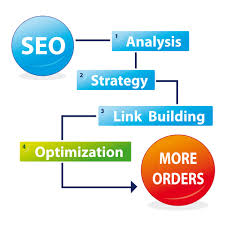
In the digital age, Search Engine Optimization (SEO) is crucial for any website looking to increase its online visibility and attract more organic traffic. To help you navigate the complex world of SEO, we have compiled a step-by-step guide that will take you through the essential strategies and techniques to optimize your website for search engines.
The foundation of any successful SEO strategy is keyword research. Identify relevant keywords and phrases that your target audience is likely to use when searching for products or services in your industry.
Optimize your website’s on-page elements such as meta tags, headings, content, and images with the selected keywords. Ensure that your content is high-quality, relevant, and provides value to your visitors.
Improve your website’s technical aspects such as site speed, mobile-friendliness, URL structure, and sitemap. Fix any issues that may hinder search engine crawlers from properly indexing your site.
Build high-quality backlinks from reputable websites to improve your site’s authority and credibility in the eyes of search engines. Focus on acquiring natural links through guest posting, outreach campaigns, and content promotion.
Create engaging and shareable content that resonates with your target audience. Regularly update your blog with informative articles, infographics, videos, and other multimedia content to attract more visitors and encourage social sharing.
Track your website’s performance using tools like Google Analytics and Google Search Console. Monitor key metrics such as organic traffic, keyword rankings, bounce rate, and conversion rates. Analyze the data to identify areas for improvement and adjust your SEO strategy accordingly.
By following these steps diligently and staying up-to-date with the latest SEO trends and best practices, you can significantly enhance your website’s visibility in search engine results pages (SERPs) and drive more qualified traffic to your site.
Researching relevant keywords for your content is a crucial step in optimizing your website for search engines. By identifying the specific terms and phrases that your target audience is using to search for information related to your industry, you can tailor your content to align with these search queries. This not only helps improve your website’s visibility in search engine results but also ensures that your content is reaching the right audience. Conducting thorough keyword research sets the foundation for a successful SEO strategy and can significantly impact the organic traffic and engagement levels on your website.
Optimizing your website’s meta tags, including the title, description, and headings, is a fundamental step in improving your site’s SEO performance. The title tag is crucial for conveying the main topic of each page to search engines and users, while the meta description provides a brief summary that entices users to click through to your site. Additionally, using relevant keywords in your headings not only helps search engines understand the structure of your content but also enhances user experience by making it easier to navigate. By carefully crafting and optimizing these meta tags, you can increase the visibility of your website in search engine results and attract more qualified traffic to your site.
Creating high-quality and relevant content regularly is a crucial aspect of a successful SEO strategy. By consistently producing valuable and engaging content that resonates with your target audience, you not only establish your authority in your industry but also increase the likelihood of attracting organic traffic to your website. Search engines prioritize websites that offer fresh, informative content, so regularly updating your blog or website with new articles, videos, infographics, and other multimedia can significantly improve your search engine rankings and drive more traffic to your site. Remember, content is king in the world of SEO, so investing time and effort into creating compelling content can yield long-term benefits for your online presence.
Improving website loading speed is a critical step in enhancing the user experience and optimizing for SEO. A fast-loading website not only keeps visitors engaged but also reduces bounce rates and improves conversion rates. Search engines like Google prioritize websites that load quickly, making it essential for better search engine rankings. By optimizing images, reducing server response times, and leveraging browser caching, website owners can create a seamless browsing experience that not only satisfies users but also boosts their site’s visibility in search results.
Building quality backlinks from reputable websites is a crucial aspect of any successful SEO strategy. By earning backlinks from high-authority sites in your industry, you not only improve your website’s credibility and trustworthiness in the eyes of search engines but also increase the likelihood of ranking higher in search results. These backlinks act as a vote of confidence for your content, signaling to search engines that your website is a valuable resource worth promoting. Focus on cultivating relationships with authoritative websites through guest posting, content collaborations, and other link-building tactics to enhance your site’s visibility and attract more organic traffic.
Monitoring and analyzing your SEO performance regularly is a crucial step in optimizing your website for search engines. By tracking key metrics such as organic traffic, keyword rankings, bounce rate, and conversion rates, you can gain valuable insights into the effectiveness of your SEO efforts. This data allows you to identify areas for improvement and make informed decisions to enhance your website’s visibility and performance in search engine results pages. Regular monitoring and analysis ensure that your SEO strategy remains effective and adaptable to changes in the digital landscape, ultimately driving more qualified traffic to your site.